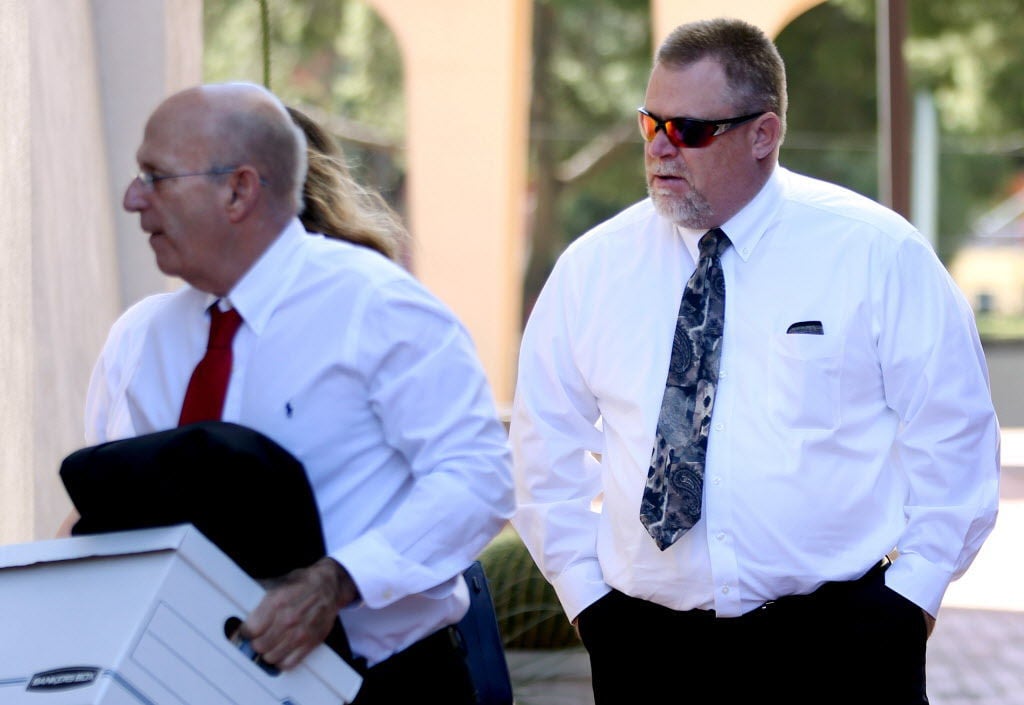A former UA track and field coach convicted last month of assaulting a student-athlete is asking for a new trial, citing prosecutorial misconduct and legal errors by the judge.
Craig Carter’s attorney filed the 15-page motion Monday, outlining 11 ways that the coach was deprived of a fair trial. Carter was convicted March 30 of two counts of aggravated assault in connection with a 2015 incident in his office. He choked University of Arizona thrower Baillie Gibson while threatening her with a box cutter; the two were involved in a sexual relationship.
Attorney Dan Cooper wrote that the misconduct began in opening statements and continued throughout the three-day trial.
Cooper cited six incidents of misconduct by prosecutors:
- Gibson testified that when she told campus police she was intimate with Carter in May 2012, she wasn’t referring to sex. Defense attorneys requested a mistrial, saying prosecutors knew she was going to change her story. Cooper said prosecutors knew there was a strategy to deal with Gibson’s “prior contradictory statements” but deliberately didn’t ask what the strategy was. The motion for a mistrial was denied. Cooper said the prosecution’s deliberate avoidance of learning the strategy was a violation of due process.
- In closing arguments, prosecutors urged jurors to send a message to potential perpetrators. The defense objected to the statement, and the judge told the jury the call to action was not to be considered. However, Cooper said the message “had been clearly made to the jury.”
- The prosecution said in closing arguments that Gibson was misquoted by a reporter from ABC’s “20/20.” Gibson never said she was misquoted, Cooper said, and the prosecution intentionally misstated evidence by suggesting that she had.
- Judge Teresa Godoy ruled before the trial that no evidence of Carter blackmailing Gibson into a sexual relationship would be allowed. But in closing arguments, the prosecutor said Carter had confessed to UAPD that he had blackmailed Gibson into sex, Cooper said.
- Prosecutors said that Carter took advantage of a “vulnerable person,” a statement that Godoy had previously ruled inadmissible during Gibson’s testimony, Cooper said.
- Prosecutors told the jury that intent was “the opposite of an accident,” which was misstating the law, Cooper said.
Cooper also cited four incidents in which he said Godoy made incorrect legal decisions. Two stand out: Before the trial, Godoy ruled that any evidence of Gibson’s “love” for Carter was inadmissible, saying that their relationship was not the issue. During trial, however, prosecutors discussed the relationship and said Carter was blackmailing Gibson. Carter was not able to defend himself against those claims, Cooper said, since text messages showing Gibson’s “affection” for Carter were disallowed.
During a break in Gibson’s testimony, attorneys involved in a related civil lawsuit accused the athlete’s lawyer, Lynne Cadigan, of signaling her on how to answer questions. Carter’s attorneys requested a mistrial, which was denied.
“Cadigan’s behavior was inexcusable and the court should not take the risk that the signaling had no effect,” Cooper said.
Cadigan denied Cooper's claims, saying the allegations against her are a complete lie.
"Unfortunately for (Carter's attorneys,) their client confessed to everything on video, so it was an easy decision for the jury" Cadigan told the Star.
In the motion, Carter’s attorneys also included what they said is newly discovered evidence — an exit interview that Gibson filled out a month before the incident in Carter’s office. In the survey, “Gibson is effusive in her praise of the University, the athletic department, and in particular, the assistant track coaches including Craig Carter,” the motion said. Carter’s attorneys say the survey “puts her credibility fully in question,” according to the motion. Gibson gave the same score — 6 out of 6 — to 80 of the 81 questions asked of her. She mentions Carter by name just once, alongside the names of Arizona’s other assistant coaches.
A hearing to address the motion is scheduled for April 30. Carter, who was taken into custody after the verdict, is scheduled to be sentenced May 14.





